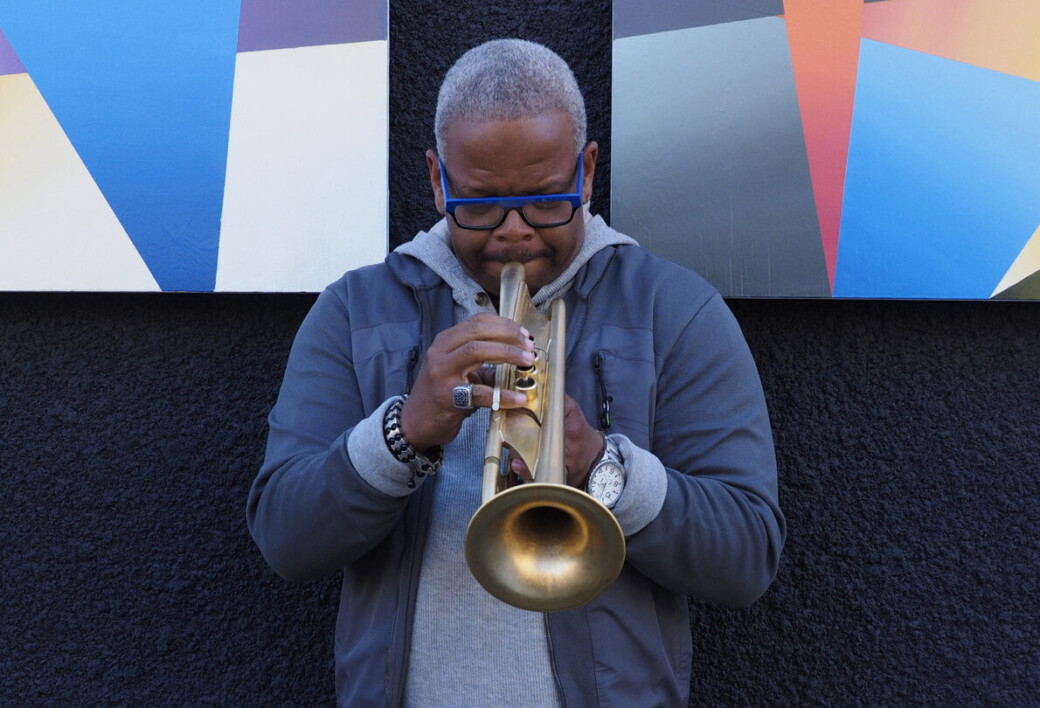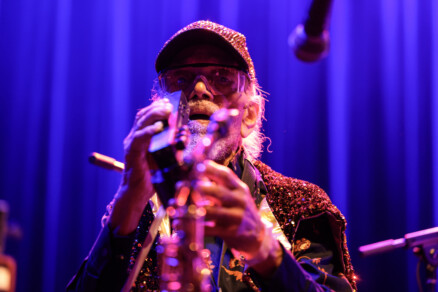‘Don’t write an opera, tell a story:’ Terence Blanchard’s path to ‘Fire Shut Up in My Bones’

New Orleanian musician Terence Blanchard is known for many things. Recently named a 2024 National Endowment for the Arts Jazz Master and appointed the artistic director of SFJazz, Blanchard launched his career over 40 years ago as a member of Art Blakey’s Jazz Messengers. He served as the band’s music director until 1986, then established himself as a bandleader. Meanwhile, he began to work in the world of film composition, famously providing the soundtracks to many of Spike Lee’s masterpieces.
Through it all, Blanchard has steadily maintained his presence as a forceful musician and educator, appearing on dozens of records as both a leader and side-musician while working and teaching at a range of top conservatories.
In the past few years, Blanchard has been on another journey, writing a pair of operas. Most recently he collaborated with the writer and filmmaker Kasi Lemmons to produce Fire Shut Up In My Bones, which wona Grammy and became the first opera written by a Black composer to be performed by the Metropolitan Opera in New York City — nearly 70 years after the late Robert Northern (later known as Brother Ah) broke racial barriers there as a performer.
These are the kind of accomplishments that one might read in a promotional bio. But to listen to Blanchard’s music is to be taken to a place that cannot really be summed up in the logics of awards and recognition. Keen to take care of that something-extra that arrives in Black sounds, Blanchard sees it as important to tell stories of the marginalized. To speak the lives and speak life to those who have never seen their stories be staged became the motivation for Fire Shut Up in My Bones, based on Charles Blow’s memoir of the same name.
On Friday, Blanchard will bring the music from Fire to the Music Center at Strathmore. Ahead of that performance, CapitalBop spoke with Blanchard about the special challenge of composing for opera while channeling the energies of those thought excluded from that form — and the implications this has for his career and beyond.
CB: What does it mean for you to bring Fire to the D.C. area?
TB: Bringing my opera there is huge for me, for a number of reasons. We’re very proud of the story, first of all. Choosing Charles Blow’s book was something that was very important to me. He’s my homeboy, he’s from Louisiana. What he went through growing up was horrific, and yet he’s become such a success story. I kept thinking that his journey could really help a lot of people: in understanding what he went through, to let them know you can overcome anything.
It’s been a joy watching what my first opera [Champion] did in D.C. I remember one of the journalists said, “I’ve been covering opera at the Kennedy Center for 30 years, and I’ve never seen this much of a diverse audience.” Putting these stories on stage and allowing people to see themselves and see their culture on stage — it’s a huge boon for the operatic world, and it should send a clear message that we have to not only tell current stories, but allow so many different other people to come in and tell their story.
CB: I read in several places that your father was in the opera world.
TB: We always want to say, “I’m not gonna be like my parents.” … When my opera premiered at St. Louis the first time, Arthur Woodley — who was the male lead in the opera — grabbed me on the stage and put his hand on my neck, and said, “Man, your dad would be proud.” That was an emotional moment for me. Because I had forsaken those Black men in my life because they weren’t jazz musicians. But there were some of them that really loved operatic and classical music and spiritual music. And I look back on it now, and I’m like: Those were actually some brilliant dudes. I’m glad that I got a chance to turn that vision around in my mind. I always knew that it was significant — don’t get me wrong. But I didn’t understand the gravity of it, based on them being misunderstood for so long.
When I played at the Blue Room at the Roosevelt Hotel, [my dad] cried walking up the steps because he said he used to work in that hotel. And he had to go through the back room, the service entrance, and had to stay in the kitchen until it was time to bus the tables in the Blue Room. And then he goes from that to seeing his son play in the same room, and him walking through the front door. Those are the things we take for granted. And I’m lucky enough to have heard those experiences told by my father, and have them sink in at a certain point in my life. They weren’t bitter, angry. That’s the thing that really blew me away. Now, they were determined, sure. [But] they didn’t allow that stuff to eat away at them.
CB: How does that energy show up in the compositions that you wrote — this energy of determination?
TB: “Peculiar Grace.” That aria speaks to me in such a way. “I once was a boy of peculiar grace.” I grew up in a neighborhood where walking to the bus stop on a Saturday with my horn in my hand — I would go to my trumpet lessons with horn-rimmed glasses — wasn’t the most popular thing to do. I had to deal with being the oddity in the neighborhood. It was interesting reading the libretto and seeing that aria, because I would be willing to bet there’s a bunch of us that grew up that way because of our interests. We had an interest in stuff that other people in the neighborhood didn’t, and how could that be? Well, the entire opera is based on that notion.
‘Vocalists have told me they’ve been in the business for 30 years and never got a chance to relate to a character the way that they can relate to these characters.’
CB: And to channel that into the compositions.
TB: Yeah, well, the thing about it for me is, as a composer, it’s a powerful notion because I’m trying to take what I felt by listening to La Boheme, or listening to Carmen, or listening to Turandot — any of those great pieces that I heard when I was a kid, how that moved me — and now I’m trying to do that with our culture. I want the music to move with you in the same way. But it has to be done coming from our point of view, our perspective. Gaining experience in writing for orchestra has allowed me to be able to see how that’s done.
My composition teacher, Roger Dickerson, when I started doing film work, his thing was: “Man, that’s great, but you’re getting experience to do something much bigger.… Your background as a jazz musician and your experience as a film composer is going to come together for you to write something bigger.”
I had no idea. He saw that well before I did. And it was crazy. He said, “Don’t write an opera. Tell a story.” And I went, “Whoa, okay.” Then it all came together. All of the composition lessons, all of the conversations, all of the film compositions that I had done, all of the working with vocals. Hearing those vocalists, like my father, from when I was a kid, hearing that in my head — all of it came to bear in writing those pieces. I feel blessed and in a weird way I feel like I’ve been used by something much greater than me to do this. Because if you were to ask me to do this at the beginning of my career, it would have been a disaster.
I’m also understanding how I can unleash a plethora of talent that’s been held back by the culture itself. And what I mean by that is how African-American opera singers either grew up in the church singing R&B or singing jazz. They get to the operatic world and it’s, “Hey, we don’t use that phrase” and, “We don’t do that.” Because Puccini wrote that shit years ago. So did Verdi, Wagner and all of those guys, right? So for me, I’m like, “No, I want all of that.”
CB: Yeah. So they get to be free from that restriction.
TB: Yes, they bring all of that to bear. Vocalists have told me they’ve been in the business for 30 years and never got a chance to relate to a character the way that they can relate to these characters. Just because of that. And I remember Angel Blue, when she sang the aria that I was talking about, she said: “So is it okay if I bring some of my church?” I’m like, “Please? Please bring all of that.” And when she did it in person like that for the first time, man, everybody was in tears.
CB: I want to talk a little bit about the phrasing that you use to describe the recent work, as an “opera in jazz.”
TB: The reason why I say “opera in jazz” is because I didn’t want people to think it would be a jazz band playing the entire time. There’s moments where there’s no jazz trio playing. There’s a trio inside of the orchestra, obviously. But there’s moments where there’s just straight orchestration, and I’m trying to do what Stravinsky and all of the great composers have done [which] is to bring folklore to the orchestral world. And that’s the whole point. There’s no deep meaning behind it. It’s just more, giving people an indication of what to expect when they come to hear the piece.
CB: What can we expect for this show at the Strathmore?
TB: We’re working on some new music right now. So we’ve been doing a blend of a lot of different things. And then we have a show that we’ve been touring with some singers from Fire. We’ll be doing a little bit of that too. So a plethora of a lot of things. But the cool part about it, you know, it’s all experimental. And it’s all fun.


